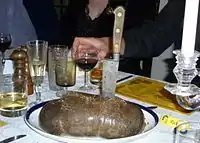haggis
See also: Haggis
English
WOTD – 25 January 2018
Etymology 1

A whole haggis at a Burns supper

Haggis (top left) served with neeps and tatties (mashed swede and potatoes; bottom and top right)
From Late Middle English hagis (“haggis”), from hag, haggen (“to chop, cut, hack; to cut into”) (from Old Norse hǫggva (“to hew”)),[1] or from hakken (“to chop, hack; to dice, mince”) (from Old English hēawan (“to chop, hew; to dice, mince”)),[2] both ultimately from Proto-Indo-European *kewh₂- (“to hew; to beat, strike; to forge”).[3]
Pronunciation
- (Received Pronunciation) IPA(key): /ˈhæɡɪs/
- (General American) IPA(key): /ˈhæɡɪs/
Audio (AU) (file) - Hyphenation: hag‧gis
Noun
haggis (countable and uncountable, plural haggises)
- A traditional Scottish dish made from minced sheep offal with oatmeal and spices, etc., originally boiled in the stomach of a sheep but now often in an artificial casing, and usually served with neeps and tatties (mashed swede and potatoes) and accompanied with whisky.
- [1677, Guy Miege [i.e., Guy Miège], “HAGGESS”, in A New Dictionary French and English, with Another English and French; According to the Present Use, and Modern Orthography of the French. Inrich’d with New Words, Choice Phrases, and Apposite Proverbs; Digested into a Most Accurate Method; and Contrived for the Use Both of English and Foreiners (in French), London: Printed by Tho[mas] Dawks, for Thomas Basset, at the George, near Cliffords-inn, in Fleetstreet, OCLC 874955677, column 3:
- HAGGESS, haggas, or haggis, ſort d'appret fait avec des herbes, du larde caupé menu, des épices, des œufs, & du fromage, le tout mis enſemble & bouilli dans une panſe de brebis.
- HAGGESS, haggas, or haggis, a sort of preparation made with herbs, bacon, spices, eggs, cheese, all put together and boiled in a sheep's belly.]
- 1717 January 16 (Old Style), Lady Mary W. Montague [i.e. Lady Mary Wortley Montagu], “Original Letter of Lady Mary W. Montague, Never before Published. Found Lately amongst the Papers of a Lady Deceased.”, in The Scots Magazine; or General Repository of Literature, History, and Politics, volume LXI (volume VI, New Series), Edinburgh: [Printed by Alex[ander] Chapman and Co.] Sold by James Watson, No. 40. South Bridge, and by the principal booksellers in Town and Country and by T. Kay, Strand, London, published February 1799, OCLC 11612901, pages 101–102:
- I congratulate the Caledonians on the acquiſition of this new Saint, but wonder if the German crows were ſo civil to refrain from ſo ſavoury a Scotch haggiſs.
- 1762, [Charles Johnstone], The Reverie; or, A Flight to the Paradise of Fools. By the Editor of The Adventures of a Guinea. In Two Volumes, volume II, Dublin: Printed by Dillon Chamberlaine, in Smock-alley, OCLC 741687034, page 185:
- "[…] You are all for providing other things before we have fixed upon the victuals. Let us ſettle about them firſt." / This word raiſed a tumult, ten times greater than the former; every one in the room roaring out at once for ſome particular diſh, either that it was his trade to provide, or which he was fond of himſelf. / […] —"An haggis,"—ſaid a Scot. / —"Leek-pottage,"—ſputtered Taffy. In a word, they all raiſed their voices with ſuch vehemence, not one attending to what another ſaid, that ſince the building of Babel, there was not ſuch a ſcene of confuſion.
- [1769], [John Maclaurin, Lord Dreghorn], “The Disappointed Epicures”, in Essays in Verse, [Edinburgh: Privately printed at the author's press], OCLC 519698997, page 78:
- And thank kind heav'n, their country can afford / A tumid haggeſs to adorn their board.
- 1778 February 5, Thomas Pownall, “XXXII. Observations Arising from an Enquiry into the Nature of the Vases Found on the Mosquito Shore in South America.”, in Archaeologia: Or Miscellaneous Tracts Relating to Antiquity, volume V, London: Published by the Society of Antiquaries of London; sold at the house of the Society, in Chancery-Lane; and by Messieurs White, Robson, Conant, Leigh and Sotheby, Brown and H. Payne, published 1779, OCLC 316379034, page 322:
- The Haggies is that very diſh (if I may ſo call it) and a very good diſh it is. […] [W]henever inſtead of the paunch, refinement ſhall invent a veſſel, in which to ſerve up the Haggies, it will certainly reſemble in its model the original prototype, whether it be formed into a turrene or a ſilver vaſe, having the ſinged head as ornamented handles to the ſides.
- 1821 October, “The Voyages and Travels of Columbus Secundus. Chapter XIII. The King’s Birth-day.”, in Blackwood’s Edinburgh Magazine, volume X, number LVI, Edinburgh: William Blackwood; London: T[homas] Cadell, Strand, London, OCLC 1781863, footnote, page 305:
- [T]he thousands of Englishmen who annually visit our romantic country can attest, that, even in the wildest Highland glens, something better can be found for their roast-beef stomachs, than sheep's-heads, haggises, and oat-meal cakes.
- 1894, Jessup Whitehead, “The Hotel Book of Puddings”, in The American Pastry Cook: A Book of Perfected Recipes, for Making All Sorts of Articles Required of the Hotel Pastry Cook, Baker and Confectioner, Especially Adapted for Hotel and Steamboat Use, and for Cafés and Fine Bakeries, 7th edition, Chicago, Ill.: Jessup Whitehead & Co., publishers, OCLC 21526304, page 78, column 1:
- Another one of those revered patriarchs whom it were almost sacrilege to touch is [Robert] Burn's, with "honest sonsie face," the haggis. […] It is a pity that one of the last minstrels, if only one of humble rank, did not fix unchangeably in verse the component parts of the national haggis, as some one has done the "Eve's pudding," and Sydney Smith did for his salad, and another did for mulled wine. We have a compound called haggis, without the preceding article, composed of meat, chopped anchovies, eggs, bread, sour wine, pepper and salt. But that does not seem to correspond with the remarks of an editor of Burns, who says the haggis was to Scotland what the plum pudding is to England, and it was the pride of her people that all the ingredients and even the bag it was boiled in were of native production.
- 1999, Gary Rhodes, “Home-made Haggis”, in New British Classics, London: BBC Worldwide, →ISBN:
- Haggis has a faggot-like consistency that certainly isn't short of flavour. I like to make individual portion haggises (traditional haggises are cooked in the sheep's paunch or stomach). It can also be made into a steamed haggis pudding simply by making the recipe, placing the mix in two 1.75 litre (3 pint) pudding basins, covering with buttered foil and then steaming for 3½ hours.
- 2015, Simon Majumdar, “The Baron and the Bronx”, in Fed, White, and Blue: Finding America with My Fork, New York, N.Y.: Hudson Street Press, →ISBN, pages 62–63; trade paperback edition, New York, N.Y.: Avery, Penguin Random House, 2016, →ISBN:
- [T]he final dish of the day arrived in the form of a giant blood pudding, which was about the size of a basketball and wrapped in the goat's stomach. It reminded me more of Scottish haggis than of anything else I had seen on my travels around the globe. I took a tentative bite. It was fantastic, but I was completely done by this point and made my apologies to the disappointed restaurant owner. He seemed happy enough, particularly when he smiled and said, "Don't worry, anything that's left, I'll be taking home for dinner."
-
Alternative forms
- haggess, haggies, haggiss (obsolete)
Translations
traditional Scottish dish
|
References
- “haggis”, in Lexico, Dictionary.com; Oxford University Press, 2019–2022; “haggen, v.”, in MED Online, Ann Arbor, Mich.: University of Michigan, 2007, retrieved 28 October 2017.
- “hakken, v.”, in MED Online, Ann Arbor, Mich.: University of Michigan, 2007, retrieved 28 October 2017.
- “hagis, n.”, in MED Online, Ann Arbor, Mich.: University of Michigan, 2007, retrieved 28 October 2017.
Further reading
 haggis on Wikipedia.Wikipedia
haggis on Wikipedia.Wikipedia
Etymology 2
haggi + -s.
Pronunciation
- (Received Pronunciation) IPA(key): /ˈhɑːdʒis/
Audio (UK) (file) - (General American) IPA(key): /ˈhɑd͡ʒis/
- Hyphenation: hag‧gis
Noun
haggis
- plural of haggi (“one who has participated in a hajj”) (alternative spelling of hajjis).
Dutch
Etymology
Borrowed from English haggis.
Pronunciation
- (Netherlands) IPA(key): /ˈɦɛ.ɡɪs/
Audio (file) - Hyphenation: hag‧gis
Noun
haggis m (uncountable)
- haggis
See also
- schapenmaag
Finnish
Etymology
From English haggis.
Pronunciation
- IPA(key): /ˈhɑɡːis/, [ˈhɑɡːis̠]
- Rhymes: -ɑɡːis
- Syllabification(key): hag‧gis
Noun
haggis
- haggis
Declension
| Inflection of haggis (Kotus type 39/vastaus, no gradation) | |||
|---|---|---|---|
| nominative | haggis | haggikset | |
| genitive | haggiksen | haggisten haggiksien | |
| partitive | haggista | haggiksia | |
| illative | haggikseen | haggiksiin | |
| singular | plural | ||
| nominative | haggis | haggikset | |
| accusative | nom. | haggis | haggikset |
| gen. | haggiksen | ||
| genitive | haggiksen | haggisten haggiksien | |
| partitive | haggista | haggiksia | |
| inessive | haggiksessa | haggiksissa | |
| elative | haggiksesta | haggiksista | |
| illative | haggikseen | haggiksiin | |
| adessive | haggiksella | haggiksilla | |
| ablative | haggikselta | haggiksilta | |
| allative | haggikselle | haggiksille | |
| essive | haggiksena | haggiksina | |
| translative | haggikseksi | haggiksiksi | |
| instructive | — | haggiksin | |
| abessive | haggiksetta | haggiksitta | |
| comitative | — | haggiksineen | |
| Possessive forms of haggis (type vastaus) | ||
|---|---|---|
| possessor | singular | plural |
| 1st person | haggikseni | haggiksemme |
| 2nd person | haggiksesi | haggiksenne |
| 3rd person | haggiksensa | |
French
Pronunciation
- (aspirated h) IPA(key): /a.ɡis/
Audio (file)
Noun
haggis m (plural haggis)
- haggis
Polish
Etymology
Borrowed from English haggis.
Pronunciation
- IPA(key): /ˈxaɡ.ɡis/
Audio (file) - Rhymes: -aɡɡis
- Syllabification: hag‧gis
Noun
haggis m inan
- haggis
Declension
Declension of haggis
| singular | plural | |
|---|---|---|
| nominative | haggis | haggisy |
| genitive | haggisu | haggisów |
| dative | haggisowi | haggisom |
| accusative | haggis | haggisy |
| instrumental | haggisem | haggisami |
| locative | haggisie | haggisach |
| vocative | haggisie | haggisy |
Further reading
- haggis in Wielki słownik języka polskiego, Instytut Języka Polskiego PAN
- haggis in Polish dictionaries at PWN
Portuguese
Noun
haggis m (uncountable)
- haggis (Scottish dish made of minced offal and oatmeal)